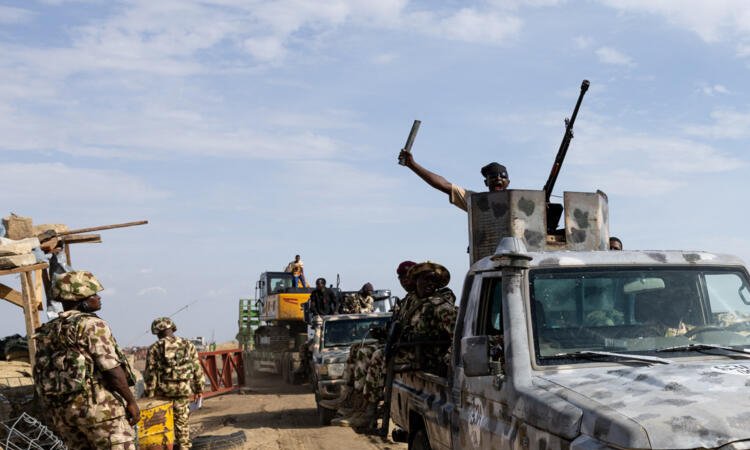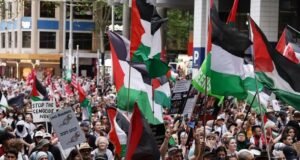
At least 63 people, including five soldiers, were killed on Friday night when jihadist fighters stormed the town of Darul Jamal in northeastern Nigeria’s Borno state, officials confirmed on Saturday.
The town, located near the Nigeria-Cameroon border, had recently been repopulated by families previously living in displacement camps.
The attack has raised serious questions about the Nigerian government’s policy of closing down internally displaced persons (IDP) camps and returning people to communities that remain vulnerable to extremist violence.
“It’s very sad. This community was resettled some months ago and they went about their normal business,” said Borno State Governor Babagana Zulum. “As of now, we confirm that 63 have lost their lives, both the civilians and the army.”
Town overwhelmed, homes torched
Residents said the assault began around 8:30 pm, when dozens of armed jihadists riding motorbikes descended on the town, firing indiscriminately and setting homes ablaze.
“They came shouting, shooting everyone in sight,” said Malam Bukar, a survivor who fled with his family. “When we returned at dawn, bodies were everywhere.”
Local sources vary slightly on the death toll, with a civilian militia leader citing 55 deaths, while an NGO worker put the number at 64.
Most victims were recently relocated from the Bama Government Secondary School displacement camp, which was shut down by authorities earlier this year. Survivors expressed deep frustration.
“The government told us we would be safe here,” said Hajja Fati, a mother of five who lost her brother. “Now we are burying our people again.”
Military response and air force claims
The Nigerian air force later claimed to have killed 30 terrorists in an aerial operation during the attack, though the military has not publicly confirmed the total number of casualties or issued a detailed statement.
The area where the attack occurred is known to be under the influence of Boko Haram commander Ali Ngulde, who, according to a security source, led the assault.
Resurgence in jihadist violence
While violence in the region had declined since the peak of the Boko Haram insurgency (2013–2015), attacks have escalated again in 2025, mostly carried out by Islamic State West Africa Province (ISWAP), a Boko Haram splinter group.
According to Good Governance Africa (GGA), the first half of 2025 saw:
300 jihadist attacks
Over 500 civilian deaths
17 military bases overrun by ISWAP
The group has increasingly used drones, night raids, and foreign fighters to strengthen its operations, further stretching Nigeria’s already thin security resources.
Regional instability and policy concerns
Nigeria’s counterinsurgency efforts have been complicated by regional dynamics. Neighbouring Niger’s withdrawal from a key multinational task force has weakened coordinated efforts against insurgents. Domestically, the military is also tied up fighting banditry in the northwest, limiting its capacity in the northeast.
Meanwhile, economic hardships under President Bola Tinubu have fuelled rural discontent, creating fertile ground for extremist recruitment and influence, analysts warn.
Governor Zulum, while expressing grief, also acknowledged the limitations of the military, saying, “The numerical strength of the Nigerian army is not enough to contain the situation.” He added that a new force, called Forest Guards, will be deployed to support security operations in vulnerable areas.
The attack on Darul Jamal is one of the deadliest in recent months and underscores the growing risk of prematurely resettling displaced populations in volatile regions without adequate protection.
 Weekly Bangla Mirror | Bangla Mirror, Bangladeshi news in UK, bangla mirror news
Weekly Bangla Mirror | Bangla Mirror, Bangladeshi news in UK, bangla mirror news







